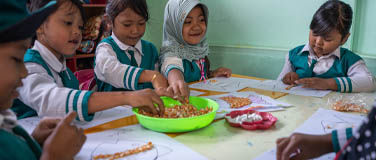
Sudan has experienced a relentless escalation of conflict with far-reaching consequences, causing devastating harm to individuals, social structures, infrastructure, and the economy. The United Nations reported that, since the eruption of the war in April 2023, over 8.2 million individuals have been forced to leave their homes, seeking shelter within and beyond the country’s borders.
Currently, Sudan holds the record for the largest population of internally displaced persons (IDPs) and the most significant child displacement crisis globally. Approximately 37% of Sudan’s population, about 17.7 million people, are suffering from serious food insecurity due to conflict and displacement. Trade disruptions caused by insecurity have led to reduced trade flows and increased prices, impacting rural households’ access to food. Additionally, climate-related shocks and economic challenges, including currency devaluation, and inflation, are exacerbating the crisis.
The World Bank is committed to stay engaged in Sudan and to continue to support the wellbeing of the people of Sudan. In an effort to alleviate their hardships and build resilience, the World Bank has worked hand in hand with development partners to approve the Sudan Somoud – Enhancing Community Resilience Project.
The project, funded by a $130 million grant from the Sudan Transition and Recovery Support (STARS)* Multi-Donor Trust Fund, will provide funding directly to the United Nations Children’s Fund (UNICEF) and the World Food Programme (WFP), and will be implemented in partnership with international and local non-government organizations (NGOs).
“As the conflict continues to spread, we must find ways to extend support to the people of Sudan. Through Somoud, we aim to improve access to essential services and food security for over 560,000 IDPs and host community members across Sudan. The project will also enhance community-led services and support training and incentives for frontline workers, thereby preserving essential service delivery systems and providing agency to Sudanese communities in shaping their future.” said Victoria Kwakwa, World Bank Regional Vice President for Eastern and Southern Africa.
Additionally, the project seeks to enhance food security by boosting the resilience and agricultural capacity of more than 16,000 farmers and cooperatives in conflict-impacted areas, as well as supporting the private sector as a key element of a renewed functional market system. This will be achieved through the development of agricultural value chains and the expansion of community cooperatives and market points for vulnerable groups, including IDPs.
“We are excited to launch the ‘Sudan Somoud’ project, which will put development in the hands of communities in Sudan,” said Milena Stefanova, World Bank Country Manager for Sudan.
“Through our collaboration with UNICEF, WFP, and NGOs we aim to improve access to basic services such as health, education, water and sanitation, enhance food security, and empower local communities. This project is a testament to our commitment to supporting the people of Sudan and our trust in a better, sustainable, and more resilient future.”
The project is aligned with the World Bank Strategy for Fragility, Conflict, and Violence (FCV) 2020-2025 of remaining engaged through conflict and crises by building resilience, protecting essential institutions, delivering critical services, and supporting private sector development.
- The STARS Trust Fund serves as an umbrella coordination platform for World Bank engagement in Sudan’s recovery and transition efforts. It is generously supported by Canada, the European Union, Finland, France, Germany, Ireland, Italy, the Kingdom of Saudi Arabia, the Netherlands, Norway, Spain, Sweden, and the United Kingdom. (End)
